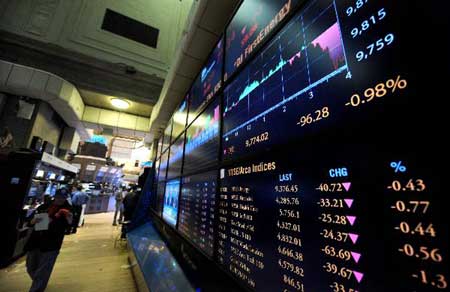World Business
US House OKs sweeping bank rules; Senate vote awaits
(Xinhua)
Updated: 2010-07-01 15:28
 |
Large Medium Small |
|
 |
|
The index is seen on a screen in the New York Stock Exchange in New York, the United States, June 30, 2010. Wall Street fell on Wednesday as mixed data stirred investors' concerns on economic growth outlook. [Xinhua] |
WASHINGTON – Nearly two years after a Wall Street meltdown left the economy reeling, the House on Wednesday passed a massive overhaul of financial regulations that would extend the government's reach from storefront thrifts to the executive suites of Manhattan.
Senate support for the far-reaching bill remained in flux, however. The Senate was forced to delay its vote to mid-July, denying President Barack Obama a victory before Independence Day. Democrats struggled to secure the votes of a handful of Republican senators even after meeting their demands and backing down on a $19 billion tax on big banks and hedge funds.
The legislation, swelling to more than 2,000 pages, would rewrite the nation's regulatory books. Simple supermarket purchases and exotic derivatives trades would be subject to new laws. And the entire financial system would be placed on a risk watch in hopes of thwarting the next threat of a financial crisis.
Obama hailed the vote as "a victory for every American who has been affected by the recklessness and irresponsibility that led to the loss of millions of jobs and trillions in wealth."
The 237-192 House tally broke largely along party lines but attracted more support than in December when no Republicans voted for the House version of the bill. The new legislation combines the House bill with one passed by the Senate last month.
|
||||
Republicans portrayed the bill as a vast overreach of government power that would do little to prevent future bailouts of failing financial institutions. They complained that it failed to place tighter restrictions on Fannie Mae and Freddie Mac, the mortgage giants forced into huge federal bailouts after their questionable lending helped trigger the housing and economic meltdowns.
"This legislation is a clear attack on capital formation in America," said Rep. Eric Cantor of Virginia, the second-ranking House Republican. "It purports to prevent the next financial crisis, but it does so by vastly expanding the power of the same regulators who failed to stop the last one."
Only three Republicans voted for the bill: Joseph Cao of Louisiana, Mike Castle of Delaware and Walter Jones of North Carolina. Nineteen Democrats voted against it, eight fewer than in December.


